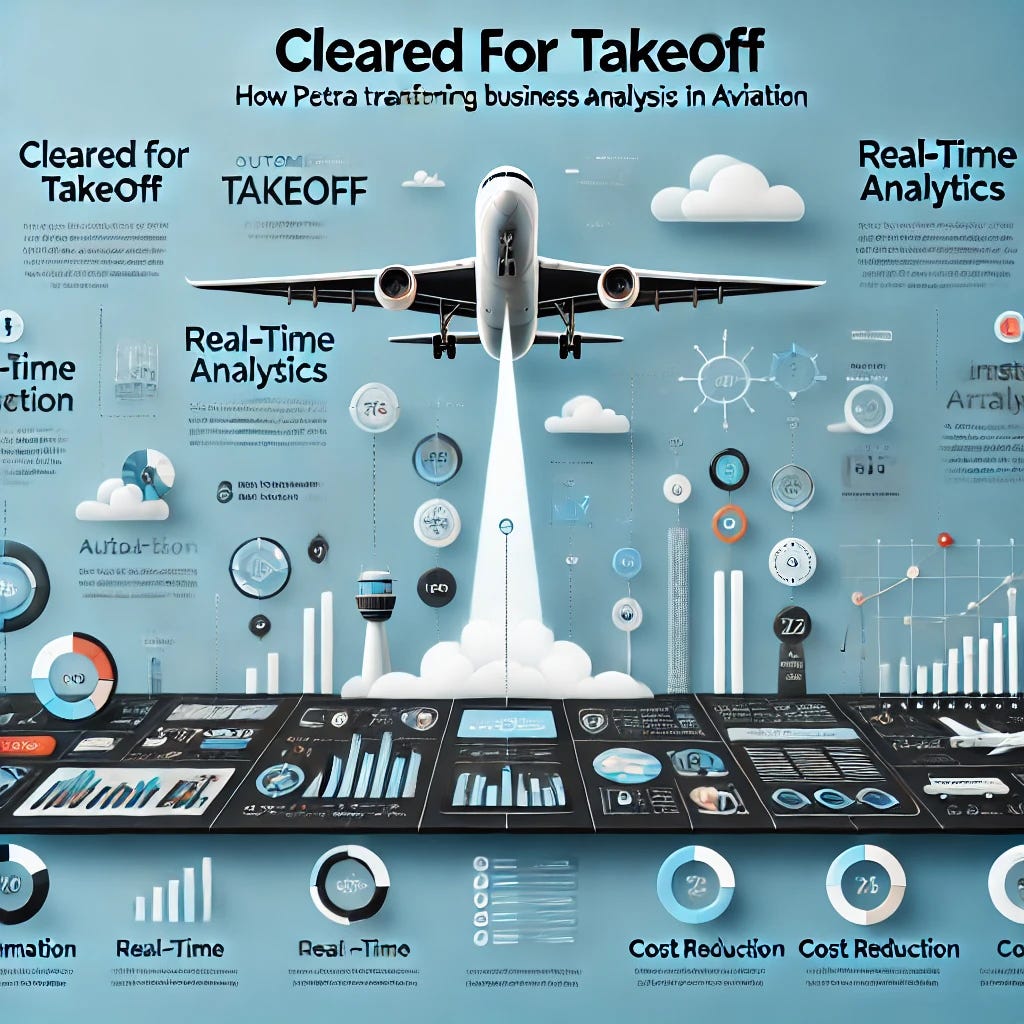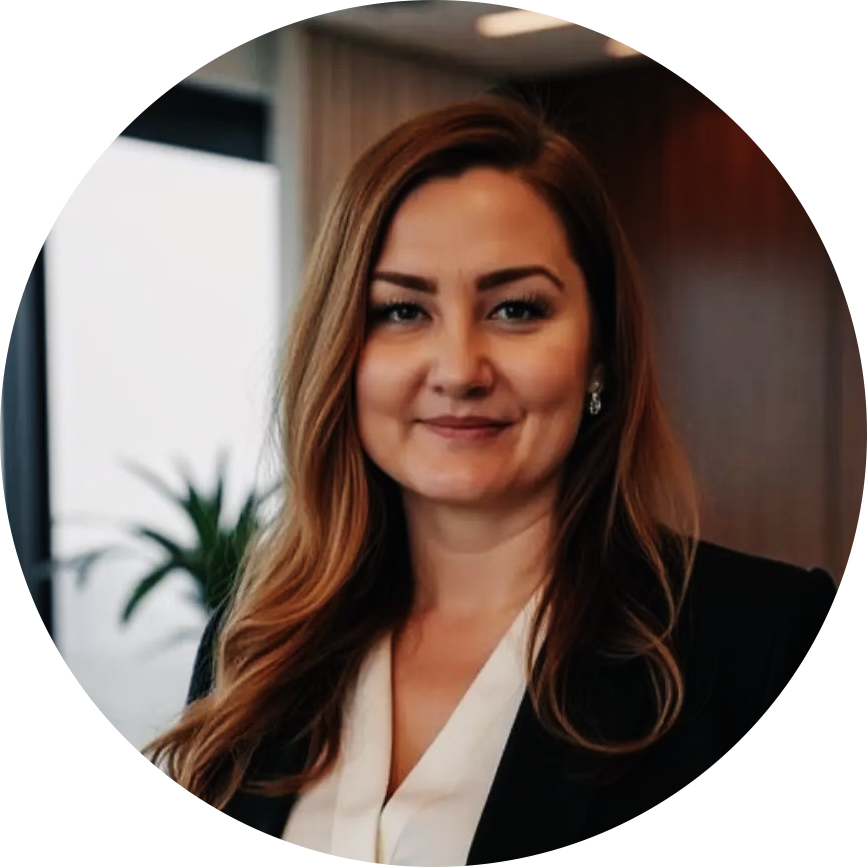Cleared for Takeoff: How Pextra is Transforming Business Analysis in Aviation
Navigating Process Turbulence: One Analyst's Journey to Optimize Airline Operations from the Ground Up
Introducing Our Business Analyst Spotlight Series
We're excited to launch a new series highlighting remarkable business analysts making an impact across various industries.
Through these conversations, we aim to provide deeper insights into the world of business analysis—showing how these professionals adapt to evolving team needs while sharing practical advice, proven methodologies, and occasional humor.
The series is organized into thematic segments, allowing you to easily find stories and tips relevant to your professional journey and perhaps discover some inspiration along the way.
Let's dive into our first interview, which focuses on the aviation industry and how a business analyst navigates the complexities of processes, data, and regulations in modern aviation.
Petra (Pextra) Jánošíková, Aviation Tech Innovator
A passionate business analyst in her 30s, originally from Slovakia and now living in Prague. She transitioned from dispatch operations to IT, working remotely to drive digital transformation in aviation.
Her expertise bridges aviation and technology, enhancing efficiency and modernization in the industry.
How did you become a business analyst? What attracted you to this role?
I started in the operations department, where I gradually got involved in testing various tasks and system feutures. I became fascinated by the technical aspects, which made me see opportunities for growth in this field.
When I shared my interest in taking on new challenges, the IT team extended an offer to me. Moving into the business analyst role felt like a seamless transition—I was able to apply my previous experience while learning new methodologies
The combination of technical skills and analytical thinking is what drew me to this role the most.
Can you describe what a typical workday for you involves?
My day begins with preparing for the morning meeting. We operate in a hybrid setup across two continents, so my morning routine involves gathering information across time zones, updating my agenda, and prioritizing the key tasks,
The status meeting, usually around 10 AM CET, focuses on updates, deadlines, and issues that need resolution. This structured approach helps keep the team aligned and ensures that everyone knows their priorities.
After the morning meetings, I focus on a range of tasks, including data analysis, process redesign, and stakeholder communication. This allows me to blend strategic thinking with practical, hands-on work as a business analyst.
When we talk about work, which tool do you find most valuable, and which one do you find the most frustrating?
The most useful tool for organizing tasks and projects is Phabricator. It's similar to JIRA but free, offering a clear overview of assignments, progress tracking, and efficient team communication.
Alongside tools like GitLab and Microsoft Project, I also rely heavily on communication tools. While Teams isn’t necessarily frustrating :), it can sometimes be a bit of a headache. It’s a great example of a tool that can be overly complex which, making it more frustrating than helpful.
Of course, I can't forget the AI tools I use. I rely on ChatGPT for almost all of my process drawings and UI screen designs.
How do you manage to stay energized and focused during long days filled with back-to-back meetings and intense analysis?
Regular “unplugging” is key for me.
When I feel overwhelmed by back-to-back meetings and analyses, I take a short break—whether it’s stepping outside for fresh air, taking a quick walk, or simply pausing to reset. This small "reset strategy" helps me maintain focus, clear my mind, and stay engaged throughout the day.
These short breaks are essential for me to prevent burnout and sustain productivity.
What work achievement stands out as your proudest, and what makes it so significant for you?
Actually, I’m most proud of a recent project where we redesigned an outdated application.
It was a complex task, requiring both technical improvements and a much better user experience. By adding new features and optimizing workflows, we significantly enhanced usability.
The positive feedback from end-users was incredibly rewarding, reinforcing the impact of my work. This experience also taught me the importance of cross-team collaboration and well-thought-out system design."
Do you have a mentor who guides you in your career?
Yes, I highly value my mentor, who provides immediate and constructive feedback. Through regular meetings and consultations, she helps me navigate new challenges and explore career development opportunities.
Her advice and expertise are indispensable, frequently helping me navigate both professional and technical challenges.
How do you take notes during meetings? Do you have a specific system?
Although I store a lot of information in digital tools like Obsidian, I still prefer handwritten notes. Writing things down not only helps me retain key details and quickly summarize main points but also enhances my creative thinking.
The physical act of writing allows me to focus more deeply and stay organized. While I sometimes transfer these notes into a digital format, the process of writing by hand remains a powerful tool for concentration and idea generation.
Which type of deliverable do you enjoy creating the most—presentations, reports, wireframes, or something else?
I enjoy creating wireframes the most because it allows me to be creative from the very beginning and design structured solutions from scratch.
Wireframes help me visualize ideas and understand how the final product will work. Of course, it depends on the project—sometimes I also enjoy working on detailed reports or presentations, but designing a concept from the ground up is the most fulfilling for me.
How do you continuously improve and grow in your role?
I explore new tools, read industry articles and books, and participate in professional courses.
Mentoring and feedback from colleagues also help me identify areas for improvement.
I also believe in taking risks, learning from my mistakes, and consistently reflecting on my work processes to drive continuous improvement.
Let’s talk about something more laid-back—how much coffee do you need to power through the day, and what else helps you stay sharp?
I usually have at least two coffees a day—that’s enough to keep me energized and focused.
But beyond coffee, I rely on regular breaks and physical activity to stay refreshed and maintain concentration throughout long work hours. This balanced approach helps me stay productive without feeling drained.
What was the most challenging technical skill you had to learn, and how did you master it?
One of the toughest skills I had to learn was working with complex systems and APIs. Initially, it was overwhelming due to the number of new concepts and technical details.
However, through experimentation, learning from mistakes, and seeking guidance from colleagues, I managed to master it. A key factor was my willingness to research and utilize online resources, which helped me overcome the initial challenges.
How do you stay up to date and continue learning?
I primarily learn through online courses, with Czechitas programs (a Czech nonprofit organization empowering women in technology) being especially valuable, as they offer both paid and free options.
In addition, I read industry books and articles to stay updated on the latest trends in IT and business analysis. Recently, I read an insightful book, Co-Intelligence: Living and Working with AI, which explores how to work effectively with AI models to get the best outputs.
I also engage in regular knowledge exchanges with colleagues, and mentorship plays a key role in my ongoing learning and growth.
In what ways do you incorporate AI into your daily work?
AI is a valuable tool for me, helping with information retrieval, generating responses, and automating repetitive tasks.
I use AI several times a day to quickly verify facts or gain insights for decision-making. This significantly speeds up my workflow and allows me to focus on creative and strategic tasks.
Key Takeaways:
The journey of a business analyst in aviation is both dynamic and rewarding. It’s a unique blend of technical expertise, analytical thinking, and a deep understanding of the aviation industry's operations.
For business analysts working remotely, maintaining focus, leveraging the right tools, and engaging in continuous learning are essential. By embracing new methodologies, staying up-to-date with industry trends, and fostering strong professional relationships, they continue to drive positive change in the aviation industry.
Adaptability and Growth – A career in business analysis requires a willingness to learn and adapt, balancing technical knowledge with a strong analytical mindset.
Effective Time Management – Managing time effectively through structured routines and regular breaks helps maintain focus and productivity in long days filled with meetings and analysis.
Tool Proficiency – Utilizing the right tools, like Phabrikator, GitLab, and Microsoft Project, enhances task organization and project management, although it's important to avoid overly complex or cumbersome tools.
Continuous Learning – Lifelong learning, through courses, mentoring, and self-reflection, is key to professional development and staying competitive in a fast-paced industry.
AI Integration – Incorporating AI tools in daily tasks, such as automating repetitive processes and aiding decision-making, can significantly increase efficiency and reduce workload.
Creative Problem-Solving – Business analysts thrive by finding innovative solutions, whether through wireframing or system design, ensuring that new systems are both user-friendly and functional.
Mentorship and Support – Having a mentor and a supportive team provides invaluable guidance, helping navigate challenges and identify career development opportunities.
This combination of technical proficiency, effective communication, and continuous growth shapes the successful business analyst in the aviation industry.
Stay tuned for our next interview—don’t forget to subscribe!
Is there a topic we didn’t cover in the interview that you'd love to hear about? Let us know in the comments!
If you know an inspiring junior business analyst who deserves the spotlight in our Business Harbor, reach out to us.



